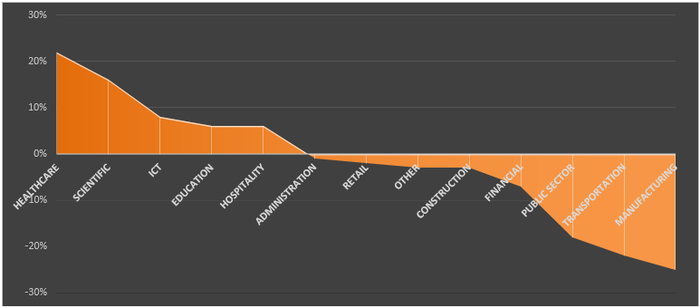PwC says AI is actually a good thing for jobs in the UKPwC says AI is actually a good thing for jobs in the UK
Global accountancy firm PwC has defied logic and contextual awareness by declaring artificial intelligence will actually have a positive impact on the UK’s employment numbers, creating more jobs than it destroys.
July 18, 2018

Global accountancy firm PwC has defied logic and contextual awareness by declaring artificial intelligence will actually have a positive impact on the UK’s employment numbers, creating more jobs than it destroys.
According to its latest UK Economic Outlook Report, PwC predicts 7 million jobs will be displaced over the next twenty years, as AI plays a more influential role in business and society, though 7.2 million jobs will be created. The impact will be largely neutral, though there will be more a fraction more jobs created perhaps due to the limited role industries such as manufacturing and agriculture plays in the UK.
“Major new technologies, from steam engines to computers, displace some existing jobs but also generate large productivity gains,” said John Hawksworth, Chief Economist at PwC.
“This reduces prices and increases real income and spending levels, which in turn creates demand for additional workers. Our analysis suggests the same will be true of AI, robots and related technologies, but the distribution of jobs across sectors will shift considerably in the process.”
The UK is primarily a services industry, in the region of 80% of GDP, with many training courses and careers focused on this segment. The initial, and perhaps most damning, impact of AI will be on industries like manufacturing and transportation where intelligent robotics can revolutionise the market. Think of smart factories or autonomous vehicles, these are technology developments which will make the human redundant in these work environments, but how many factory workers do you know in the UK?

Looking at a perfect world, where everyone plays by the rules, we can see why PwC has come to the conclusion more jobs will be creating in the UK. It isn’t a country which is reliant on the industries which will be negatively impacted, while there are segments which can create value out of the insight which is created. If you listen to the promises of AI developers, the aim is to remove the mundane tasks out of an employee’s work schedule, freeing up time to concentrate on value add tasks. The theory is a proactive workforce, which is positively searching for new opportunities for the company.
In reality, we suspect the world will be entirely different.
Healthcare, a segment which is used by PwC to convey its point of how AI will create new jobs and value, is one which is primed for the productivity gains. In the UK, the NHS is constantly under stress, with administrators complaining the financial strain will soon begin to impact the service which can be offered to citizens. PwC points towards a richer and aging society as positive trends, but the NHS budget, and the ability to offer care services above the basic, are not improving.
AI will improve efficiency within the NHS, but it will be used as a means to make the service a less of a loss making machine. Jobs will be lost, or not replaced upon retirement, but such is the financial strain on the service, there won’t be funds to reallocate.
You also have to look at the maths as well. Should the NHS be able to replace simplistic administrative jobs with intelligence software, how much budget will this create for new hires. Let’s say 100 low-skilled jobs were displaced, a bit will be skimmed off for budget efficiency, some will be spent on the software itself, leaving notably less to spend on new hires. How many skilled data scientists will this allow for? We can guarantee it won’t be 100.
This is a contextual example, but it is applicable to almost every segment. When there is an opportunity to spend less on a company’s largest overhead, its payroll, many senior managers will see this as an opportunity to win bonus points with investors. Improving profitability, even if top-line revenues do not change that much, is a win after all; the CEO is making more money for shareholders. Many managers are short-sighted, such is the pressure they are facing from shareholders. This is also applicable to the public sector.
PwC seems to be taking a very optimistic view on society and the management teams of corporations who claim to care about the welfare of employees and society on the whole. We agree with the assumption the impact will be reduced due to the focus of the UK on the services industry, but we are not sure the majority of CEOs are the visionary managers which PwC seems to give them credit for.
For a long-time AI will be viewed as a means to reduce the workforces impact on spreadsheets and improve profitability. Eventually companies will start seeing how AI and data scientists can improve operations, and this might start another hiring spree, but we suspect these organizations will be the exception not the rule. It might be a sceptical view, but such are the pressures on management teams to improve performance and profitability.
About the Author
You May Also Like










.png?width=300&auto=webp&quality=80&disable=upscale)


_1.jpg?width=300&auto=webp&quality=80&disable=upscale)